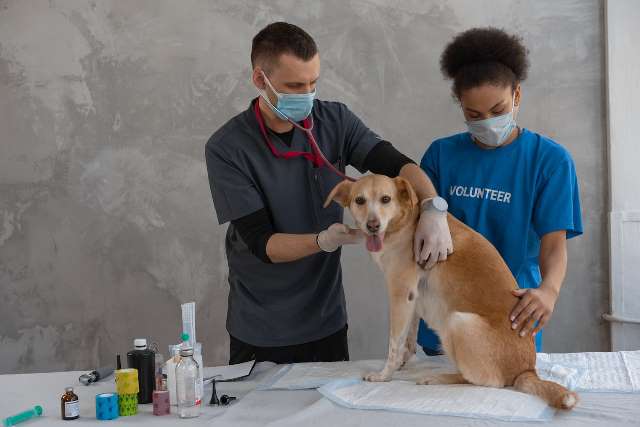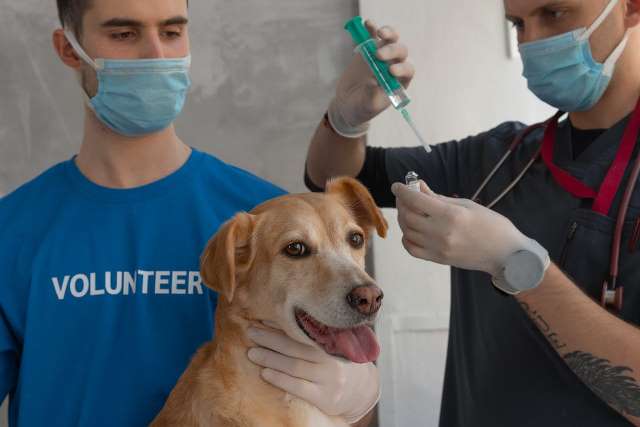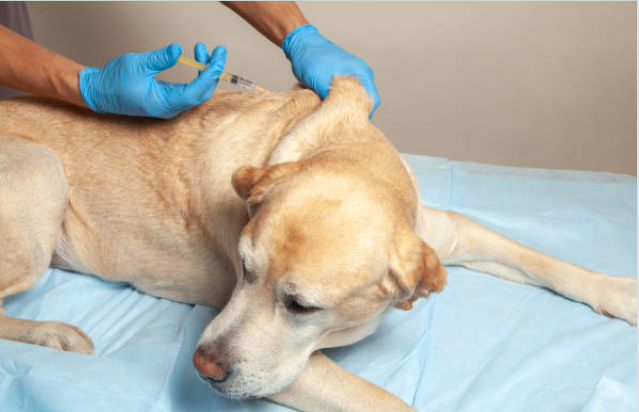Vaccinations are crucial for keeping dogs healthy. They protect against serious diseases and help maintain public health.
Understanding the types of dog vaccinations is essential for every pet owner. This article explores the core and non-core vaccinations, their importance, and when to administer them.
By staying informed, you can ensure your dog receives the best possible care. Let’s dive into the different types of dog vaccinations and their roles in your dog’s health.
Why Vaccinations?
Vaccinations play a vital role in canine health. They stimulate the immune system to recognize and fight off diseases.
When a dog receives a vaccination, it trains the immune system to respond quickly to specific pathogens.
Core and Non-Core Vaccines
Vaccines fall into two categories: core and non-core. Core vaccines are essential for all dogs, while non-core vaccines depend on the dog’s lifestyle and environment.
Core vaccines protect against widespread and serious diseases. Non-core vaccines target specific risks based on a dog’s location or activities.
Understanding these types of dog vaccinations helps ensure your pet is adequately protected.

Core Dog Vaccinations
Core dog vaccinations are essential for every dog. They protect against serious, life-threatening diseases that can easily spread. Here are the key core vaccinations every dog should receive:
- Rabies
Rabies is a deadly virus that affects the brain. Vaccination is crucial, as it is often required by law. Puppies typically receive their first rabies shot at around 12 to 16 weeks. - Distemper
Canine distemper is a highly contagious virus. It affects multiple body systems, including the respiratory and nervous systems. Vaccination helps prevent this severe illness. - Parvovirus
Parvovirus is highly contagious and can be fatal. It primarily affects puppies and unvaccinated dogs. A parvo vaccine is vital to prevent this disease. - Adenovirus (Canine Hepatitis)
Adenovirus causes liver disease in dogs. It can lead to severe complications. Vaccination protects against this potentially fatal illness.
If your dog receives these core vaccinations is critical for their health and safety. Consult your veterinarian for the appropriate vaccination schedule.
Non-Core Dog Vaccinations
Non-core dog vaccinations provide additional protection based on a dog’s lifestyle and environment. While they are not mandatory, they can be important for certain dogs.
Here are some common non-core vaccinations:
- Bordetella (Kennel Cough)
Bordetella is a highly contagious respiratory infection. It spreads easily in places like kennels and dog parks. Vaccination is recommended for dogs that frequently interact with others. - Lyme Disease
Lyme disease is transmitted by ticks. It can lead to serious health issues, especially in certain regions. If you live in an area with high tick exposure, vaccination is advisable. - Leptospirosis
Leptospirosis is caused by bacteria found in water and soil. It can affect both dogs and humans. Dogs at risk of exposure should receive this vaccine. - Canine Influenza
Canine influenza is a contagious respiratory virus. It can cause mild to severe illness. Vaccination is recommended for dogs that may be exposed to other dogs, especially in communal settings.

Vaccination Schedules
Vaccination schedules are crucial for keeping dogs protected. Puppies need a specific schedule to ensure they receive their core and non-core vaccinations on time.
Puppy Vaccination Schedule
Puppies typically start vaccinations at six to eight weeks of age. They receive a series of shots every three to four weeks until they are about 16 weeks old.
Key vaccines during this time include distemper, parvovirus, and adenovirus.
Booster Shots
After the initial vaccinations, adult dogs require booster shots. These help maintain immunity against diseases.
Core vaccines generally need boosters every one to three years, depending on the vaccine and local regulations.
Individual Considerations
Vaccination schedules may vary based on a dog’s health, age, and lifestyle. Dogs with specific risks may need additional non-core vaccines.
Always consult your veterinarian to create a tailored vaccination plan for your dog. Keeping up with vaccinations is essential for your dog’s long-term health.
Potential Side Effects and Risks
Like any medical treatment, dog vaccinations can have side effects. Most reactions are mild and temporary. However, it’s important to be aware of potential risks.
Common Side Effects
Many dogs may experience slight soreness at the injection site. Others might have mild fever or lethargy. These reactions usually resolve within a day or two.
Rare but Serious Reactions
In rare cases, dogs may have more severe reactions. These can include allergic responses, such as difficulty breathing or swelling. If you notice these symptoms, contact your veterinarian immediately.
When to Consult a Veterinarian
It’s essential to discuss any concerns about dog vaccinations with your veterinarian. They can provide guidance on what to expect and how to manage any side effects.
Overall, the benefits of vaccinations far outweigh the risks. Keeping your dog vaccinated helps protect them from serious diseases.

Importance of Consultation with Veterinarians
Consulting with a veterinarian is crucial for your dog’s health. They can help you understand the types of dog vaccinations your pet needs.
Each dog is unique, and their vaccination plan should reflect that.
Tailored Vaccination Plans
Veterinarians assess factors such as age, health status, and lifestyle. This ensures your dog receives the appropriate core and non-core vaccinations.
Regular Health Check-Ups
Regular vet visits are important for monitoring your dog’s health. During these check-ups, your vet can update vaccination records and recommend boosters as needed.
Staying Informed
Veterinarians can also provide valuable information on vaccination protocols and emerging diseases. Keeping informed helps you make the best choices for your dog’s health.
By working closely with your veterinarian, you ensure your dog stays protected and healthy throughout their life.

Conclusion
Dog vaccinations are essential for your pet’s health and safety. They protect against serious diseases and help prevent outbreaks. Understanding the types of dog vaccinations both core and non-core ensures your dog receives the best care.
Regular consultations with your veterinarian are vital. They can tailor a vaccination schedule to fit your dog’s needs.
Keeping your dog up-to-date with vaccinations is a responsible choice. It promotes a healthier life for your pet and peace of mind for you.
Make dog vaccinations a priority in your pet care routine. Your dog’s health depends on it.
Feedback Request
Thank you for reading about the types of dog vaccinations! We hope you found the information helpful and informative.
Do you have any questions or experiences to share regarding dog vaccinations? We’d love to hear from you! Please leave your comments below and let us know your thoughts.
Your feedback is important to us and can help other dog owners make informed decisions for their pets.
Frequently Asked Questions (FAQs)
1. Why are dog vaccinations important?
Dog vaccinations are crucial for protecting pets from serious and potentially fatal diseases. They also help prevent the spread of these diseases within the community.
2. What are core dog vaccinations?
Core dog vaccinations are essential for all dogs, regardless of their lifestyle. These include vaccinations for rabies, distemper, parvovirus, and adenovirus.
3. What are non-core dog vaccinations?
Non-core dog vaccinations are recommended based on a dog’s environment and lifestyle. Examples include vaccines for Bordetella (kennel cough), Lyme disease, and leptospirosis.
4. When should I start vaccinating my puppy?
Puppies should begin their vaccination series at six to eight weeks of age. They typically receive shots every three to four weeks until they are about 16 weeks old.
5. How often do adult dogs need booster shots?
Adult dogs generally need booster shots for core vaccinations every one to three years, depending on the specific vaccine and local regulations.
6. What should I do if my dog has a reaction to a vaccine?
If your dog experiences severe symptoms after vaccination, such as difficulty breathing or swelling, contact your veterinarian immediately. Mild reactions are usually normal and resolve quickly.
7. Can I skip vaccinations for my dog?
Skipping vaccinations can leave your dog vulnerable to serious diseases. Always consult your veterinarian about the best vaccination plan for your pet.